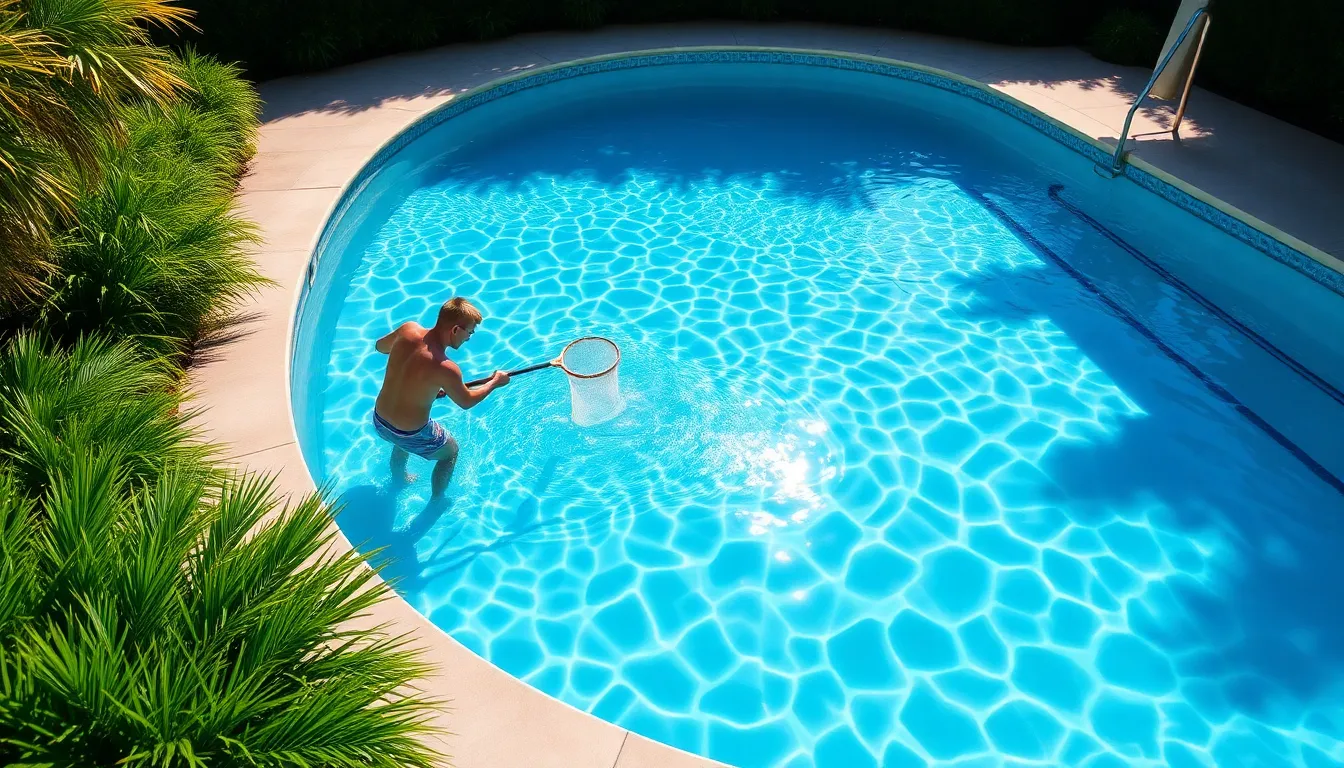Table of Contents
ToggleNothing says summer like a sparkling clean pool, right? But let’s face it—nobody wants to take a dip in water that looks like it’s been borrowed from a swamp. Clean pool water isn’t just about aesthetics; it’s about safety and enjoyment. Who wants to swim in a bacterial buffet?
Importance Of Clean Pool Water
Clean pool water plays a vital role in ensuring safety and enjoyment for swimmers. Maintaining water clarity enhances the overall swimming experience.
Health Benefits
Clean water reduces the risk of waterborne illnesses such as Giardia and E. coli. Chlorine levels must stay balanced, as proper disinfection eliminates harmful bacteria and viruses. Regular testing ensures chemical levels remain optimal, preventing irritation and infections. Swimmers can confidently enjoy the water when proper sanitation practices are in place. Using a pool cover when not in use also helps keep the water clean and reduces debris accumulation.
Aesthetic Appeal
Visually appealing pool water enhances outdoor spaces, making them inviting. Clear water emphasizes the pool’s color and cleanliness, creating a tranquil environment. Swimmers are more likely to choose a clean pool over one that looks neglected. Installing adequate filtration systems helps maintain pristine water conditions, while regular skimming prevents surface debris. Utilizing proper lighting can further enhance the visual impact of clean water during evening swims.
Common Contaminants

Maintaining clean pool water requires vigilance against various contaminants. Understanding these contaminants helps in effective pool maintenance.
Organic Contaminants
Organic contaminants include substances derived from living organisms. Leaves, insects, and algae frequently accumulate in pools, creating a murky appearance. Body fluids like sweat and urine pose additional concerns for water safety. These contaminants increase bacteria levels, raising the risk of waterborne illnesses such as Giardia. Regular skimming and vacuuming eliminate many organic materials. Shock treatments can also restore water clarity by breaking down these organic compounds.
Inorganic Contaminants
Inorganic contaminants originate from non-living sources. Common examples include dirt, debris, and metals such as copper and iron. They often enter pools through wind, rain, and swimmers. High levels of inorganics can lead to discoloration and staining on pool surfaces. Testing water regularly helps detect and manage these contaminants. Using a quality filtration system enhances removal efficiency and maintains water clarity. Frequent backwashing of filters ensures optimal performance and keeps pool water clean.
Methods For Achieving Clean Pool Water
Achieving clean pool water involves systematic methods that maintain clarity and safety. Two primary approaches, filtration systems and chemical treatments, play key roles in this process.
Filtration Systems
Filtration systems act as the first line of defense against contaminants. These systems can include sand, cartridge, or diatomaceous earth filters, each offering unique benefits. Regular maintenance, such as backwashing sand filters or replacing cartridges, ensures optimal performance. Operating continuously ensures that debris and impurities remain effectively removed, keeping the water clear. Filtering systems typically require minimal energy and can last years with proper care.
Chemical Treatments
Chemical treatments are essential for keeping pool water safe and balanced. Chlorine stands as the most common disinfectant, effectively eliminating harmful microorganisms. Testing water chemistry regularly helps maintain appropriate chlorine levels, usually between 1 and 3 ppm. Other chemicals, such as algaecides and stabilizers, support long-term water clarity and sanitation. Shock treatments, conducted periodically, can address sudden spikes in organic contaminants. Using these chemicals correctly minimizes risks of irritation and ensures a safe swimming environment.
Maintenance Tips
Maintaining clean pool water requires consistent effort and attention. Implementing regular routines and monitoring chemical levels ensures a safe and enjoyable swimming environment.
Regular Cleaning Routines
Establishing a cleaning routine prevents contaminants from accumulating in the water. Skimming the surface daily removes leaves, bugs, and other debris, promoting clear visibility. Vacuuming the pool weekly addresses dirt that settles on the bottom, helping to maintain cleanliness. Brushing the pool walls and floor weekly prevents algae growth, keeping the surfaces inviting. Regularly emptying the skimmer and pump baskets enhances filter efficiency, ensuring optimal water circulation. Cleaning the tiles around the waterline also improves aesthetics and helps to prevent buildup.
Monitoring Chemical Levels
Testing the water chemistry weekly is crucial for maintaining clean pool water. pH levels should range between 7.2 and 7.8, ensuring swimmer comfort and chemical efficacy. Chlorine levels need to be maintained between 1 and 3 parts per million to effectively disinfect the water and fight bacteria. Additionally, monitoring alkalinity helps stabilize pH levels, while calcium hardness prevents corrosion and scaling. Regular adjustments of chemicals based on test results can sustain clarity and minimize health risks. Using a reliable test kit or strips provides accurate readings, guiding necessary chemical additions for a safe swimming experience.
Maintaining clean pool water is essential for a safe and enjoyable swimming experience. By implementing consistent maintenance practices and monitoring chemical levels, pool owners can significantly reduce health risks and enhance the aesthetic appeal of their pools. Regular skimming and vacuuming, along with effective filtration systems, play a crucial role in keeping contaminants at bay.
Investing time in proper pool care not only promotes a healthier environment but also encourages more swimmers to enjoy the refreshing waters. With a commitment to cleanliness and safety, everyone can look forward to countless hours of enjoyment in their pristine pools.




